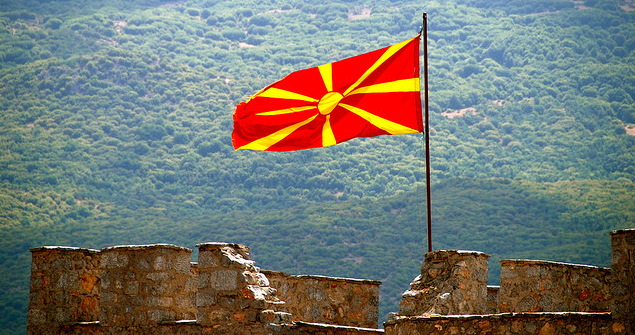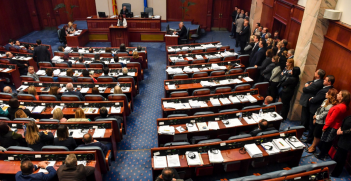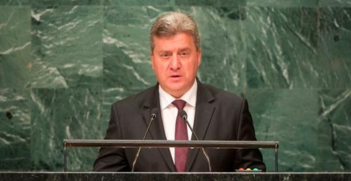Time for Australia to Recognise the Republic of Macedonia

Australia’s refusal to recognise the Republic of Macedonia is exacerbating the European country’s political and economic exclusion from the international community.
Although I rarely take exception to the Australian government’s foreign policy, the failure of successive federal governments to call the Republic of Macedonia by its constitutional name is an issue of great importance. On every occasion when the name issue comes up for those Australians of Macedonian heritage – and there are more than 100,000 – they feel insulted by this country’s continued use of the term ‘Former Yugoslav Republic of Macedonia.’ Yugoslavia itself ceased to exist some 20 years ago and Australia continues to be locked in the past.
Why? There is no doubt that both sides of politics are ultimately fearful that this one issue will somehow galvanise the Australian Greek community into a block vote against whoever makes this change to recognise the Republic of Macedonia. Both sides are wrong. Those of Greek heritage are pretty much like every other ethnic community of second generation or more heritage in this country. They are not locked into some false and paranoiac belief that Australia officially uttering the words ‘Republic of Macedonia’ will somehow lose territory of the Hellenic Republic. Australians of Greek heritage have bigger issues in their lives than this and they vote like any other Australians on issues that really affect them, such as the economy and opportunities for them and their families. There are a handful of Australians of Greek heritage who do contact members of parliament and talk about how many votes would be lost by whoever made such a change. But it remains a handful and, despite the talking, there are not enough people who would vote only on this issue to affect the result in a single electorate. It is tragic that literally a handful of nationalists can exert such power as to control the foreign policy of the nation.
Of course, that is not the reason given as to why Australia is against doing the right thing on the name issue. Officially, the government’s biased position is to stand with a very small group of nations, a group that does not include Australia’s traditional allies of the United States, the United Kingdom or Canada. This small group excuses their biased pro-Greek position by talking about the need to remain committed to the UN-sponsored process that aims to achieve a mutually accepted agreement over the name issue. This is of course a smokescreen that is good for hiding behind for a perceived domestic political advantage.
Australia’s position is wrong on many counts. Firstly, that stated objective can be achieved by maintaining the reference to the Former Yugoslav Republic of Macedonia at the UN and in multilateral fora. Secondly, it does not take any notice of the outcomes over the last almost 20 years. Those outcomes have been minimal and, despite very big concessions on the Macedonian side regarding borders and even changing their flag, the Greek side insists that the name ‘Macedonia’ cannot be in the name of the country at all. Former Greek Prime Minister Samaras said in the past that all they have to do is to ensure there is no agreement at these UN sponsored talks and Albanian nationalism and other economic instability resulting from economic problems will see Macedonia fall apart.
In vetoing Macedonia’s entry to the EU and NATO, the International Court of Justice found against Greece in 2011. The ICJ said that Greece, in vetoing Macedonia, had broken the original agreement to not bar the way for their neighbour. I find it disappointing that DFAT does not acknowledge this and, overall, provides advice that is biased.
Following a visit to Greece and the Republic of Macedonia in 2011, I believe that there is a real reason why Greece bars the economic future of the Republic of Macedonia by locking them out of the EU and NATO. That reason is that if they were allowed into the EU, then EU laws would allow those who lost houses and land, after the civil war in the 1940s, to claim restitution and the cost would be highly challenging for Greece to bear.
Prime Minister Tony Abbott said late last year that the Macedonia request for bilateral name recognition was ‘fair enough’. Yes, it is fair enough that Australia should do the right thing and recognise the Republic of Macedonia by its constitutional name. This would actually help the UN-sponsored process by increasing pressure to end the intransigence and get real negotiation happening. Australia’s duty should be to change to an unbiased position by providing bilateral recognition and increasing pressure to end the economic siege provided by the vetoing of entry to the EU. Bureaucrats who excuse Australia’s biased position by talking about freedom of the press and independence of the judiciary should know that Macedonia has already met the standards for entry to the EU.
Australia has so far taken a biased position and, through its unwillingness to seek progress, we are helping to hurt the economy of a small nation in Europe. The Greek government wants instability in the region and the government’s support of one side aids them. Over the terms of successive governments Australia has held back the homeland of some 100,000 immigrants to Australia and it is no surprise that they are not happy about it. The time to do the right thing has come.
Luke Simpkins is the MP for Cowan, Western Australia. This is an edited version of a speech delivered to the Australian Parliament on 17 March 2015. It is republished with permission.





